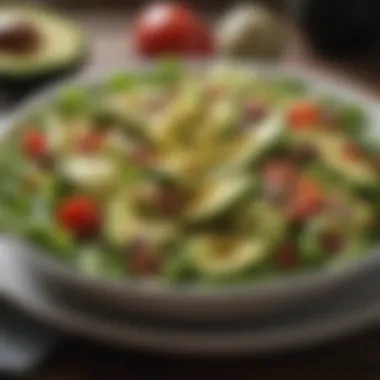Effective Strategies for a Healthy Diet to Trim Belly Fat and Improve Wellness


The focus of this article is to unveil strategic approaches to adopting a healthy diet that efficiently targets excess belly fat, thereby benefiting one's overall health. By incorporating sound dietary tactics rooted in scientific research, individuals can optimize their fitness journey while working towards achieving their weight loss objectives.
To commence this insightful exploration, it is imperative to understand the cardinal importance of nutrition in the realm of shedding belly fat. The significance of dietary choices cannot be overstated, as they play a pivotal role in molding the body's composition, particularly in the abdominal region. Therefore, this article serves as a beacon of guidance for individuals aspiring to tackle the prevalent issue of belly fat through informed dietary decisions.
Delving deeper, the article delves into the intricate nuances of crafting a sustainable and balanced diet plan aimed at reducing belly fat. In an era inundated with quick-fix solutions and fad diets, the emphasis here lies on fostering a long-term, nourishing relationship with food. Such an approach not only aids in achieving visible results but also cultivates a positive attitude towards nutrition and overall well-being.
Moving forward, the article delves into the practical implementation of evidence-based dietary recommendations. These actionable insights are not mere conjecture but are rooted in scientific studies that underscore their efficacy in promoting fat loss, particularly in the abdominal area. By adhering to these strategic guidelines, readers can navigate the complexities of the modern diet landscape with clarity and purpose, empowering themselves to make informed choices that yield tangible outcomes.
This section establishes a foundational understanding of the importance of dietary strategies in combating belly fat, setting the stage for a comprehensive exploration of actionable guidelines and expert-endorsed recommendations. By equipping readers with the knowledge and insights necessary to make informed dietary decisions, this article aims to guide them towards a path of improved health and fitness, underpinned by sound nutritional principles.
Understanding Belly Fat
Defining Belly Fat
Types of Belly Fat
When it comes to types of belly fat, two main categories exist: subcutaneous fat and visceral fat. Subcutaneous fat is found directly under the skin and is relatively harmless compared to visceral fat, which surrounds internal organs. Visceral fat is particularly concerning as it contributes to various health issues like heart disease and diabetes, making its reduction crucial for overall health and fitness.
Health Risks Associated with Abdominal Fat
Abdominal fat, especially visceral fat, poses significant health risks. It is linked to inflammation, insulin resistance, and metabolic disturbances. This type of fat is not only unsightly but can also lead to serious conditions such as cardiovascular diseases and type 2 diabetes. Understanding these risks underscores the importance of addressing belly fat through dietary modifications and lifestyle changes.
Factors Contributing to Belly Fat
Genetics
Genetics play a vital role in determining the distribution of fat in the body, including around the abdomen. Some individuals may be genetically predisposed to storing more fat in the abdominal region, making it challenging to reduce belly fat. Recognizing the impact of genetics can empower individuals to focus on targeted strategies to combat this inherited tendency.
Dietary Habits
Dietary habits such as excessive consumption of processed foods high in sugar and unhealthy fats contribute significantly to the accumulation of belly fat. Poor food choices can lead to weight gain, especially around the midsection. By adopting a balanced and nutritious diet, individuals can effectively manage their weight and reduce abdominal fat.
Lifestyle Choices
Lifestyle factors like sedentary behavior, lack of exercise, and high stress levels can also contribute to the development of belly fat. Engaging in regular physical activity, managing stress effectively, and prioritizing sleep are crucial lifestyle changes that can aid in belly fat reduction. Making conscious choices to lead a healthy lifestyle is key to successfully combating excess abdominal fat.
The Role of Diet in Losing Belly Fat
Caloric Deficit Approach


Understanding Caloric Deficit
Delving into the concept of caloric deficit, you uncover its fundamental importance in weight loss endeavors. Embracing a caloric deficit implies consuming fewer calories than your body expends, thereby prompting it to tap into stored fat for energy. The unique feature of this approach lies in its ability to accelerate fat loss while preserving lean muscle mass. Despite its efficacious outcomes, maintaining a caloric deficit demands consistency and precision in tracking your daily calorie intake, making it a popular choice among those striving for tangible results in their belly fat reduction journey.
Benefits of Caloric Restriction for Weight Loss
Exploring the benefits of caloric restriction unveils its profound impact on weight loss goals. By limiting your daily caloric consumption, you create an optimal environment for your body to burn excess fat reserves. This approach not only aids in shedding unwanted pounds but also enhances metabolic function, promoting sustainable weight management. The distinctive advantage of caloric restriction lies in its flexibility, allowing individuals to tailor their calorie intake to suit their specific needs and preferences. While effective, it's essential to strike a balance to avoid nutrient deficiencies and ensure long-term success in your weight loss endeavors.
Macronutrient Balance
Importance of Protein Intake
Highlighting the importance of adequate protein intake underscores its significant contribution to belly fat reduction. Protein plays a vital role in promoting satiety, maintaining muscle mass, and facilitating metabolic processes crucial for effective weight loss. By incorporating lean protein sources such as chicken breast, fish, and legumes into your diet, you optimize your body's ability to burn fat and preserve lean muscle mass. The key characteristic of protein intake lies in its thermogenic effect, requiring more energy to digest and metabolize, thus supporting your weight loss goals. However, moderation is key to reap the benefits of protein without compromising overall dietary balance.
Choosing Healthy Fats
Exploring the realm of healthy fats reveals their essential role in optimizing overall health and aiding in belly fat reduction. Healthy fats, such as those found in avocados, nuts and seeds, and olive oil, offer a myriad of health benefits, including improved heart health and enhanced satiety. The key characteristic of healthy fats lies in their ability to promote feelings of fullness and regulate blood sugar levels, crucial elements for successful weight management. Integrating these fats into your diet in moderation can support your weight loss journey while nourishing your body with essential nutrients.
Impact of Carbohydrates on Belly Fat
Examining the impact of carbohydrates on belly fat delves into the complex interplay between carb consumption and metabolic health. While often vilified in weight loss discussions, carbohydrates serve as the body's primary energy source and are pivotal for overall health. Opting for complex carbohydrates derived from whole grains, sweet potatoes, and quinoa provides sustained energy levels, supports digestion, and helps regulate blood sugar levels. The unique feature of carbohydrates lies in their versatility, with the potential to either hinder or aid weight loss depending on the type and quantity consumed. Striking a balance by prioritizing nutrient-dense carbs can boost your weight loss efforts without sacrificing essential dietary components.
Fiber-Rich Foods
Benefits of Fiber for Weight Loss
Exploring the benefits of fiber sheds light on its immense impact on weight loss and overall well-being. Fiber-rich foods, such as fruits, vegetables, and whole grains, not only promote digestive health but also aid in weight management by enhancing satiety and regulating blood sugar levels. The key characteristic of fiber lies in its ability to absorb water and swell in the digestive tract, promoting feelings of fullness and aiding in toxin removal. By incorporating fiber into your meals, you can support your weight loss journey while reaping the numerous health benefits associated with this essential nutrient.
Sources of Dietary Fiber
Delving into the sources of dietary fiber reveals a wealth of options to enhance your daily nutrient intake. From legumes and nuts to fruits and vegetables, the variety of fiber-rich foods available ensures you can easily meet your daily recommended intake. The key characteristic of dietary fiber sources lies in their nutrient density and versatility, offering an array of flavors and textures to suit different culinary preferences. By diversifying your fiber sources and including them in meals and snacks, you can effectively boost your fiber intake and support your weight loss goals.
Hydration and Its Effects on Belly Fat
Role of Water in Weight Loss
Unveiling the role of water in weight loss elucidates its critical impact on overall health and belly fat reduction. Staying well-hydrated not only supports proper bodily functions but also aids in appetite regulation and metabolic processes essential for weight loss. The key characteristic of water intake lies in its zero-calorie quality and its role in flushing out toxins, promoting optimal digestion, and enhancing skin health. By prioritizing adequate hydration throughout the day, you create an environment conducive to weight loss and overall well-being.
Optimal Hydration Levels
Understanding the significance of optimal hydration levels underscores the importance of meeting your body's fluid requirements for sustained health and vitality. Achieving and maintaining optimal hydration levels not only supports weight loss efforts but also enhances cognitive function, physical performance, and nutrient transport. The key characteristic of optimal hydration levels lies in their ability to promote metabolic efficiency and prevent dehydration-related complications. By monitoring your fluid intake and incorporating hydrating foods and beverages into your diet, you can optimize your hydration levels and support your weight loss journey effectively.


Strategic Food Choices for Belly Fat Reduction
In the pursuit of enhancing fitness and achieving weight loss goals, the strategic selection of foods plays a pivotal role. Understanding the nuances of Strategic Food Choices for Belly Fat Reduction is paramount in this comprehensive guide. By honing in on specific elements and benefits, individuals can design a diet that targets stubborn belly fat effectively. Key considerations revolve around incorporating lean protein sources, healthy fats, complex carbohydrates, and antioxidant-rich foods strategically.
Lean Protein Sources
When delving into the realm of building a diet focused on belly fat reduction, lean protein sources like chicken breast, fish, and legumes stand out as crucial components. These proteins not only support muscle mass maintenance during weight loss but also provide a feeling of fullness, aiding in calorie control.
Chicken breast
Chicken breast is lauded for its high protein content and low-calorie profile, making it a popular choice for those looking to shed belly fat. The lean nature of chicken breast means it is an excellent source of protein without excessive saturated fats, making it a staple in a diet aimed at belly fat reduction. Individuals benefit from its versatility in various dishes, promoting satiety and muscle recovery.
Fish
Adding fish to the diet brings abundant benefits, from high-quality protein to omega-3 fatty acids that support heart health and metabolic function. Fish varieties like salmon, mackerel, and trout are particularly rich in these essential nutrients, aiding in reducing inflammation and promoting overall well-being. Their versatility allows for enjoyment in a multitude of culinary preparations.
Legumes
Legumes, encompassing beans, lentils, and chickpeas, are plant-based protein powerhouses that contribute significantly to belly fat reduction. Packed with fiber, vitamins, and minerals, legumes offer sustainable energy levels and aid in regulating blood sugar levels. Their high satiety factor makes them an ideal choice for weight management and overall health improvement.
Healthy Fat Options
Embracing healthy fats such as avocado, nuts and seeds, and olive oil is pivotal in fostering a well-rounded diet for combating belly fat. These sources of monounsaturated and polyunsaturated fats not only enhance satiety but also support brain function, hormonal balance, and energy production.
Avocado
Avocado's rich monounsaturated fat content and various vitamins make it a standout inclusion in a diet tailored for belly fat reduction. Its creamy texture and versatile flavor make it an ideal addition to salads, smoothies, or enjoyed simply on its own. Avocado aids in nutrient absorption and contributes to feelings of fullness, promoting a balanced and nourishing diet.
Nuts and seeds
Nuts and seeds offer a potent combination of healthy fats, protein, and fiber, making them a valuable asset in the quest to lose belly fat. Varieties like almonds, walnuts, chia seeds, and flaxseeds provide essential nutrients that support heart health, help control cravings, and boost metabolism. Their crunch and flavor make them a convenient and satisfying snack option.
Olive oil
A staple in Mediterranean cuisine, olive oil boasts a range of antioxidants and anti-inflammatory properties that support weight management and overall health. With its high monounsaturated fat content, olive oil is beneficial for heart health, weight control, and satiety. Its delicate flavor enhances dishes while contributing to reducing inflammation and oxidative stress in the body.
Complex Carbohydrates for Sustained Energy
In the landscape of belly fat reduction, incorporating complex carbohydrates like whole grains, sweet potatoes, and quinoa is essential. These nutrient-dense carb sources provide sustained energy levels, aid in digestion, and offer a host of vitamins and minerals crucial for overall well-being.


Whole grains
Whole grains such as oats, quinoa, and brown rice are integral in a diet targeting belly fat due to their fiber content and slow-release energy properties. They provide crucial nutrients like B vitamins, magnesium, and fiber that promote satiety, regulate blood sugar levels, and support gut health. Including whole grains leads to stable energy levels throughout the day.
Sweet potatoes
Sweet potatoes are a versatile and nutrient-rich carb option for those aiming to reduce belly fat. Packed with vitamins, minerals, and fiber, sweet potatoes offer sustained energy without causing spikes in blood sugar levels. Their natural sweetness and earthy flavor make them a cherished component in a variety of savory and sweet dishes.
Quinoa
Quinoa, known as a complete protein, is a valuable addition to a diet focused on belly fat reduction. This ancient grain is a rich source of amino acids, fiber, and minerals like iron and magnesium. Offering a gluten-free alternative to traditional grains, quinoa aids in regulating appetite, supporting muscle recovery, and enhancing metabolic function.
Antioxidant-Rich Foods
The inclusion of antioxidant-rich foods like berries, dark leafy greens, and green tea complements a belly fat reduction diet by providing a range of health-boosting compounds. These foods help combat oxidative stress, inflammation, and support cellular health, contributing to weight loss and overall wellness.
Berries
Berries, including blueberries, strawberries, and raspberries, are renowned for their antioxidant content and low glycemic index. These vibrant fruits offer a sweet treat while promoting skin health, cognitive function, and cardiovascular well-being. Berries' versatility makes them an easy addition to breakfast bowls, smoothies, or enjoyed as a standalone snack.
Dark leafy greens
Dark leafy greens like kale, spinach, and Swiss chard are nutritional powerhouses rich in vitamins, minerals, and phytonutrients. These greens support a healthy metabolism, aid in detoxification, and provide an array of antioxidants. Incorporating dark leafy greens into meals adds a burst of color, flavor, and essential nutrients to support weight loss and enhance overall health.
Green tea
Green tea is celebrated for its catechin content, which promotes fat metabolism and boosts antioxidant activity in the body. This flavorful beverage aids in weight management, cardiovascular health, and cognitive function. Enjoyed hot or cold, green tea offers a refreshing way to stay hydrated while reaping the benefits of its metabolism-boosting properties.
Additional Tips for Effective Belly Fat Loss
Reducing belly fat goes beyond just dietary choices. Additional tips play a crucial role in achieving optimal results in one's weight loss journey. By incorporating specific strategies beyond diet, individuals can enhance their efforts and effectively target stubborn belly fat. These tips not only aid in shedding excess weight but also promote overall well-being. From portion control to stress management, each tip offers a unique perspective on optimizing weight loss goals.
Importance of Portion Control
Portion control is a fundamental aspect of effective weight management and belly fat loss. Mindful eating practices emphasize the importance of being present while consuming food, which can lead to better digestion and heightened awareness of satiety cues. By paying attention to portion sizes, individuals can avoid overeating and better regulate their caloric intake. Measuring food portions ensures that individuals are consuming appropriate serving sizes, preventing excessive calorie consumption. These practices are beneficial as they promote mindfulness and prevent mindless eating, contributing significantly to achieving weight loss goals.
Regular Physical Activity
Incorporating regular physical activity is essential for successful belly fat reduction. Cardiovascular exercises are key in burning calories and improving heart health. These exercises elevate the heart rate, leading to increased calorie expenditure. Strength training routines, on the other hand, help build muscle mass, boost metabolism, and enhance overall physical strength. Both cardiovascular exercises and strength training are vital components in a well-rounded fitness regimen, contributing to sustainable weight loss and optimal health.
Stress Management
High levels of stress can contribute to weight gain, especially in the abdominal area. Understanding the impact of stress on weight gain is crucial for effective fat loss. By implementing relaxation techniques, individuals can alleviate stress and reduce cortisol levels, a hormone linked to abdominal fat accumulation. Relaxation practices such as deep breathing, meditation, or yoga promote mental well-being and aid in weight management. Incorporating stress management techniques is vital for overall health and plays a significant role in combating belly fat.
Quality Sleep Patterns
The relationship between sleep duration and weight management is often underestimated. Disrupted sleep patterns can disrupt hormonal balance, leading to increased cravings and decreased willpower when making food choices. Establishing a bedtime routine can promote better sleep quality and regulate circadian rhythms. Creating a consistent sleep schedule and optimizing sleep conditions can improve the body's ability to burn fat and support overall health. Quality sleep is essential for weight management and plays a crucial role in achieving belly fat loss goals.







